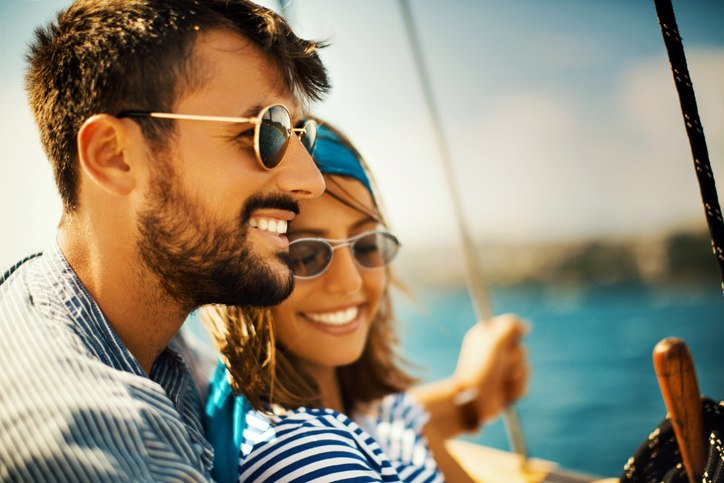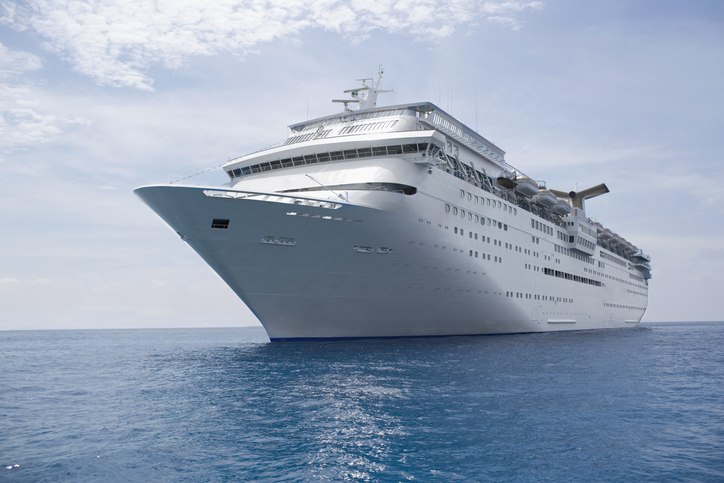Reading time: 5 minutes

Keen to sail away for your next holiday? There’s a reason cruising is so popular. Unpack once and travel from port to port aboard a floating playground; enjoy soirees in the evening, dine on 3-course meals and laze by the pool with a good book during the day – and, for an all inclusive fare that your holiday fund will thank you for? For many, travelling by cruise is a no-brainer.
Ok, I'm convinced. So, what should I consider when going on a cruise?
We've broken down what you should look at when planning a cruise:
- Destinations
- Itinerary options
- Room types
- Dining options
- Onboard activities
- Entertainment
- Packing tips
- Staying healthy
- Onboard extras
- Tips for cruising
- Travel insurance
Island hopping, anyone?
Cruising is a great opportunity to tick off multiple countries when you may only see one if you were going on a land-based holiday. And here in Australian, we're spoilt for choice for idyllic cruising destinations just a stone's throw away.
To many Aussies, cruising is synonymous with the South Pacific. Carnival, Princess and Royal Caribbean Cruises offer the opportunity to explore tropical gems including Noumea, New Caledonia, Fiji and Vanuatu. You get to soak up the sun, enjoy the tropics, swim in pristine waterways and discover new cultures - Isle take that!
Cruises around New Zealand are another great option, giving you a taste of both North and South Islands, without the painfully long drives and hotel-scheduling in between. And if you're keen to explore closer to home, gliding across the strait to Tassie is a popular pick, especially in the warmer months when the scenery is in top form.
There are also shorter 3-day cruises along the coast of Australia, which are a great taster if you're unsure if cruising is for you. Some of these may be themed such as comedy or singles cruises, or scheduled for specific events such as the Melbourne Cup or the Australian Open.
Looking further afield?
If you’ve got a bit more time up your sleeve, you can’t go past a Caribbean cruise. Think turquoise waters, white-sand beaches and vibrant island culture, all in one trip. Other popular routes include Mediterranean cruises, where you can explore historic cities like Rome, Athens and Barcelona, or Alaska, where you can glide up the Inside Passage viewing breathtaking glaciers and wildlife.
Consider how long you want to be at sea. If you haven’t tested out your sea legs it’s a good idea to start small, say, up to 10 days, to see if cruising is your style.
For each itinerary, look at:
- Which ports interest you. Ports can vary in size and accessibility – smaller ports may require a tender boat to reach the shore, while you should be able to walk straight off the ships at larger ports.
- How many days are spent ‘at sea’ versus in a port – some cruises lean into relaxation with more time onboard, while others pack in the adventure with frequent stops and excursions
- The range of shore excursions and onboard activities on offer.
Itineraries generally offer a mix of experiences ranging from lazing on a tropical beach to more action-packed and culture-based options.
Room types
Cabins, or Staterooms as they're called, vary from ship to ship, and are generally priced according to size, view, location, and amenities. Inside cabins without a window are the least expensive - you'll only be sleeping there, right? For those who prefer the whole experience and want a bit of luxury a suite or balcony room will be your go-to. For family groups there are family cabins on some liners, including Carnival, that sleep up to five people.
Dining options
Most cruises offer all-inclusive dining options, but it's worth noting that not all eateries are free. It's usually the main dining room and all-day buffet that are complimentary. There may be a higher-end or specialty restaurant option that has a surcharge and some cruise lines may have paid cafes or snack options by the pool. The restaurants and eateries that are not a part of the inclusive offerings will often bill your room for payment upon disembarkation, so it's a good idea to keep a track of the tally so you don't get a shock at payment time. Kids eat free in the paid restaurants on some ships.
Onboard activities
Some ships are floating water parks, jam-packed with water slides, open top deck pools and outdoor spas to name just a few of the attractions. You can try your hand at a range of sports such as pickleball, volleyball and even mini golf, or opt for some more cultured options such as cooking classes and art shows. If your ship has an app, be sure to check out the daily schedules to see what activities are on each day.
Entertainment
Cruise liners are as much about entertainment as they are relaxation and leisure. Entertainment may include Broadway-style stage shows, nightclubs, supper clubs, onboard cinemas, trivia nights, and kids clubs to keep the little ones entertained. Speaking sessions are often held in the ship's library at various times during the day.
Packing tips
Know the dress code and consider what activities you’ll want to do. Besides the odd formal evening, resort casual is the common vibe. Swimwear is a must, as is a good book or kindle, sunglasses, a hat and mix & match clothing options. Pack comfortable shoes for those days in port and it's best not to rely on in-room toiletries as they're often limited. A final word, make sure you leave some room in your suitcase for souvenirs and clothes that may tempt you in the ship's boutique.
Staying healthy
The last thing you want is to have you or your holiday crew succumb to sea sickness. Even if you haven't experienced travel sickness before, it's worth consulting with your GP or pharmacist regarding remedies that may calm the tummy – who knows, you may encounter some rough conditions that are unexpected. Gastroenteritis (gastro) is another common issue that can occur onboard. If you’ve been unwell prior your trip, ensure you are free of any symptoms before you set sail.
Onboard extras
Cruising is known for the all-inclusive pricing, however, there are still potential extras that may come up onboard. These can range from Kids Club and laundry, to specialty dining surcharges, drink packages, shore excursions or additional tipping. Costs can be dependent on which port you board from, for example, some cruise lines include room gratuities in the fare for cruises sailing from Australian ports while gratuities are an added extra from international ports. Additionally, if you need to buy personal essentials onboard, such as sunscreen, you may find these are at a premium price.
A few tips from experienced cruisers
- Get in the know on cruise pricing and seasons – By booking early you can get some great package offers and your top pick of itineraries. On the other end of the scale are last-minute cruise deals, however these are based on availability and you’ll be limited for itinerary selection and onboard options. If you have a group travelling you stand a much better chance of having adjoining or nearby cabins if you book early.
- Book your options early – dining times and optional activities do sell out so if you are set on dining at a specialty restaurant or a particular shore excursion, the earlier you request this the better your chances are.
- Check out drink package options onboard – they generally offer alcoholic and non-alcoholic packages.
- Cruising with all-day dining options and relaxing lounge chairs can float into the over-indulgence category for some. Setting your alarm for an early morning yoga class, gym workout or deck walk is a great way to strike some balance on board.
- Kids Club activities are generally available for children aged 2 or 3 years and up. Some ships may also have a nanny service available for younger bubs. If you’re keen to enjoy an adult-only meal or two, make sure you look into the policy and options available onboard your cruise line.

Travel Insurance
Travel Insurance Direct covers cruising as a standard inclusion, which means you won't need to fork out for additional premiums and can keep the cash you've saved for land visits or the fun stuff on board.
While most of the time it is smooth sailing, things can sometimes go off course. For example, your boat may encounter unexpected conditions; you might fall ill mid-journey; or you could face delays you hadn't counted on. All these circumstances can prove costly – medical expenses and evacuation costs alone can be exorbitant depending on the location.
What's covered?*
- Overseas medical expenses (international plans only - Australian waters are not classified as domestic waters).
- Medical evacuation and repatriation - if additional travel and accommodation is needed to get you to the nearest appropriate medical facility, we may be able to help.
- Cancellation or holiday deferment costs - if you are forced to cancel your trip due to illness or injury that is unexpected or out of your control (see the policy for details as terms and conditions apply).
- Luggage and personal effects - Our standard travel insurance includes cover for these items if they're accidentally lost, stolen or damaged, subject to terms and conditions (see the luggage section of the policy for details). Benefit limits and depreciation apply.
- Coronavirus travel costs - If you or someone travelling with you is diagnosed with the virus and you need to cancel your trip; or a close relative is hospitalised or dies due to coronavirus and it forces you to shorten your trip, travel insurance may be able to help - benefit limits apply as do exclusions if government warnings are not adhered to.
- Personal liability - TID may be able to help with damages and compensation if your negligence causes injury to a person or loss or damage to property. This excludes injury to yourself or your travelling party, or property owned by you or a member of your family or travelling party, or for which you are responsible. Travel insurance may provide cover for the costs you may incur because of that negligence, but only if you get our consent before legal costs are incurred or take legal action.
This is a brief summary of cover only and does not include the full terms, conditions, limitations and exclusions. Consider the PDS, TMD and whether the product is right for you.
The information on this page should not be considered medical advice, you should seek the advice of your doctor.